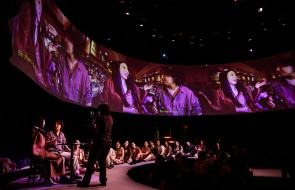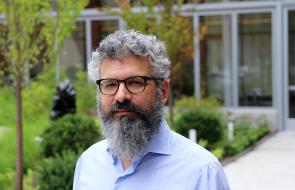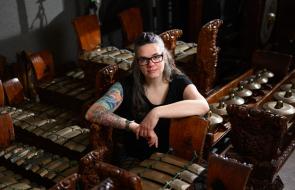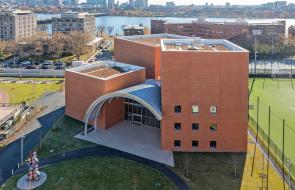Internationally acclaimed saxophonist/composer Miguel Zenón has won a Grammy® Award in the category of “Best Latin Jazz Album” for El Arte Del Bolero Vol. 2, featuring pianist Luis Perdomo.
“I’m incredibly happy and honored with this Grammy win,” says Zenón. “We’ve been making albums for a very long time, so it’s extremely rewarding to receive this recognition. This will certainly be an incentive to keep moving forward and creating more music.”
The title references the beauty of the Latin-American Songbook and the Bolero in particular. The album expands on the initial concept of El Arte Del Bolero Vol. 1 while maintaining the intent of playing songs the artists know and love. The process of choosing the repertoire began with the question, “Tu sabes que canción es bien buena?” (“You know which song is really good?”). Discussions about which versions to study, which keys to use, and which arrangements were the most inspirational followed.
Melding their jazz sensibilities with the original spirit of the music, Zenón and Perdomo deliver alluring, forward-thinking performances while keeping the songs center stage. “The Latin-American Songbook is so vast and varied that it naturally lends itself to limitless explorations,” says Zenón in the liner notes. “We purposely looked beyond the Caribbean (exploring composers from México, Venezuela and Panamá, for example) because we wanted to emphasize the point that these songs deserved to be explored and recognized for what they are, beyond labels, categories and regionalisms. Just beautiful music that is a joy to perform and listen to.”
The album was named the top Latin Jazz recording of 2023 in the Jazz Critics Poll and earned critical acclaim:
"I thought this was a beautiful, beautiful record. I kept putting it on and not wanting to take it off." – Stephen Thompson, NPR New Music Friday
"In an extraordinary follow-up to El Arte del Bolero, Vol. 1, these timeless tunes are slowed down, blended with unusual elements, played out of time, deconstructed and reconstructed as Zenón and Perdomo extract nuances from the originals that we hardly imagined could exist.” – Catalina Maria Johnson, DownBeat
“The recording’s final number ‘Silencio,’ contains a spiky first section and then moves on to a more lyrical episode before returning to the initial theme…. It is the liveliest entry in the lineup, the one that best shows off the impressive chops of both instrumentalists. In the more raucous nightclubs, excited jazz fans used to yell “talk to me” at soloists. Listening to El Arte del Bolero, Volume Two, I feel that these two masters, while recalling their various ancestries, are talking to me.” – Michael Ullman, ArtsFuse
“Zenón and Perdomo bestow each of these melodies with a careful and loving touch, as if burnishing an heirloom gemstone” – Nate Chinen, WRTI
“Miguel Zenon and Luis Perdomo practice the art of the duo at a stratospheric level. No melody resists them and everything in their interpretation seems natural; we are talking about the alchemy which links the two musicians and allows them to perform masterful improvisations on well-known themes but totally renewed in this Cd. Indispensable.“ – Yves Dorison, Culture Jazz
“Top 5 of 2023…Sublime.” – Wilbert Sostre, 90 Grados

About Miguel Zenón
Grammy® winner and Guggenheim and MacArthur Fellow, Zenón is one of a select group of musicians who have masterfully balanced and blended the often-contradictory poles of innovation and tradition. Widely considered one of the most groundbreaking and influential saxophonists of his generation, Zenón has also developed a unique voice as a composer and as a conceptualist, concentrating his efforts on perfecting a fine mix between Jazz and his many influences. Born and raised in San Juan, Puerto Rico, Zenón has recorded and toured with a wide variety of musicians including Charlie Haden, Fred Hersch, David Sánchez, Danilo Pérez, Kenny Werner, Bobby Hutcherson and The SFJAZZ Collective. Zenón has given hundreds of lectures and master classes at institutions all over the world and is a faculty member in the Music & Theater Arts Department at MIT, as well as the current Visiting Scholar for the Harmony and Jazz Composition Department at Berklee College of Music.
About Luis Perdomo
Originally from Venezuela, Grammy® winning pianist, composer, arranger and educator Luis Perdomo moved to NYC in the early 90s and has since established himself as one of the most in-demand musicians on the scene. He has recorded and/or performed with Ravi Coltrane, David Sanchez, Jerry Gonzalez and the Fort Apache Band, Tom Harrell, John Patitucci, Ray Barretto, Brian Lynch, Robin Eubanks, Dave Douglas, David Weiss and The Cookers, David Gilmore, Ralph Irizarry & Timbalaye, Henry Threadgill and Steve Turre. He has collaborated with Miguel Zenón for 20 years. Perdomo has performed at festivals and venues in over 50 countries and has released nine recordings as a leader. He has also appeared on over 200 recordings as a sideman including, most recently, two Grammy nominated albums: Ravi Coltrane’s Spirit Fiction and Miguel Zenón’s Sonero. In 2002 he earned the 2nd Grand Prix at the 3rd Martial Solal Jazz Piano Competition in Paris.
El Arte Del Bolero Vol. 2 is available on all digital platforms including Miguel’s Bandcamp page.




